不定代词
常见不定代词的用法
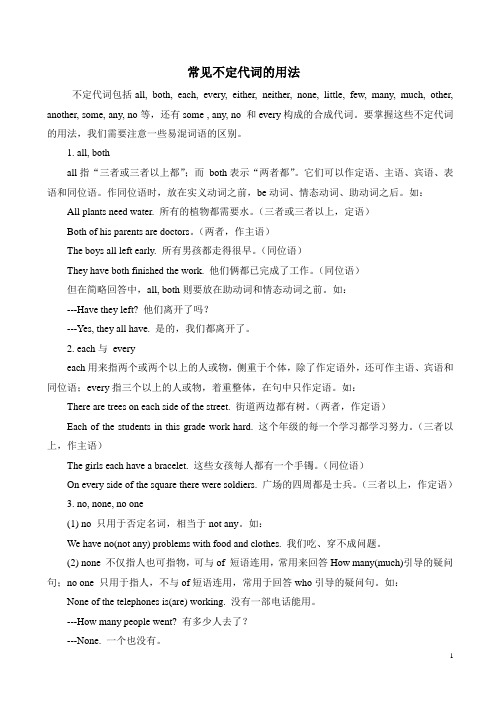
常见不定代词的用法不定代词包括all, both, each, every, either, neither, none, little, few, many, much, other, another, some, any, no等,还有some , any, no 和every构成的合成代词。
要掌握这些不定代词的用法,我们需要注意一些易混词语的区别。
1. all, bothall指“三者或三者以上都”;而both表示“两者都”。
它们可以作定语、主语、宾语、表语和同位语。
作同位语时,放在实义动词之前,be动词、情态动词、助动词之后。
如:All plants need water. 所有的植物都需要水。
(三者或三者以上,定语)Both of his parents are doctors。
(两者,作主语)The boys all left early. 所有男孩都走得很早。
(同位语)They have both finished the work. 他们俩都已完成了工作。
(同位语)但在简略回答中,all, both则要放在助动词和情态动词之前。
如:---Have they left? 他们离开了吗?---Yes, they all have. 是的,我们都离开了。
2. each与everyeach用来指两个或两个以上的人或物,侧重于个体,除了作定语外,还可作主语、宾语和同位语;every指三个以上的人或物,着重整体,在句中只作定语。
如:There are trees on each side of the street. 街道两边都有树。
(两者,作定语)Each of the students in this grade work hard. 这个年级的每一个学习都学习努力。
(三者以上,作主语)The girls each have a bracelet. 这些女孩每人都有一个手镯。
(同位语)On every side of the square there were soldiers. 广场的四周都是士兵。
不定代词的分类及用法
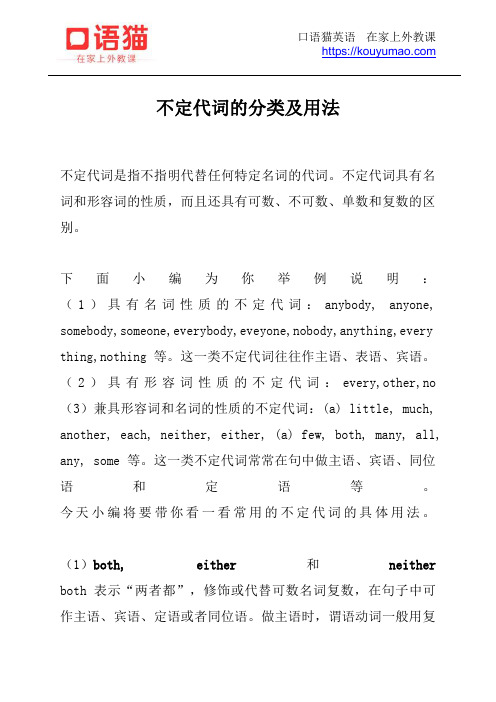
不定代词的分类及用法不定代词是指不指明代替任何特定名词的代词。
不定代词具有名词和形容词的性质,而且还具有可数、不可数、单数和复数的区别。
下面小编为你举例说明:(1)具有名词性质的不定代词:anybody, anyone, somebody,someone,everybody,eveyone,nobody,anything,every thing,nothing等。
这一类不定代词往往作主语、表语、宾语。
(2)具有形容词性质的不定代词:every,other,no (3)兼具形容词和名词的性质的不定代词:(a) little, much, another, each, neither, either, (a) few, both, many, all, any, some等。
这一类不定代词常常在句中做主语、宾语、同位语和定语等。
今天小编将要带你看一看常用的不定代词的具体用法。
(1)both, either和neither both表示“两者都”,修饰或代替可数名词复数,在句子中可作主语、宾语、定语或者同位语。
做主语时,谓语动词一般用复数形式。
例如:Both of us want to go. 我们两个人都想去。
(作主语后面的谓语动词用复数形式)My father bought two pencils for me. I like both of them.我爸爸给我买了两支铅笔,两个我都喜欢。
(作宾语)both 与not 连用时表示部分否定,意为“两者并不都”。
如果要表示全部否定要用neither. 例如:Not both my parents are for my plan.我父母并不都支持我的计划。
Neither of my parents is for my plan.我的父母都不支持我的计划。
either表示“两者中任何一个”,neither表示“两者都不”,二者都可以修饰或替代可数名词单数。
不定代词
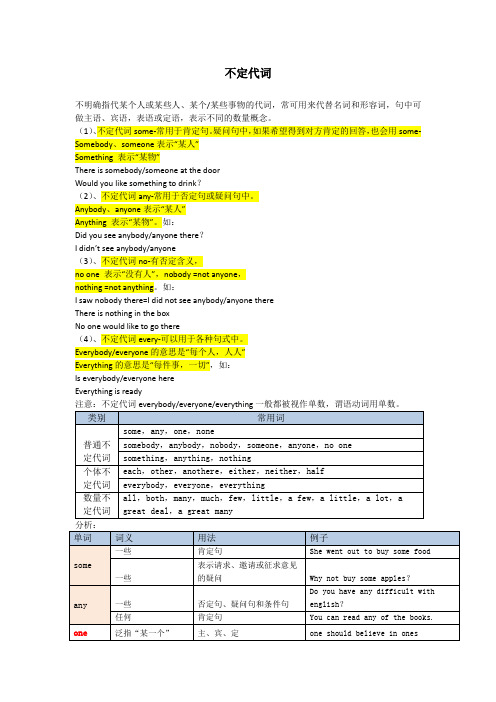
不定代词
不明确指代某个人或某些人、某个/某些事物的代词,常可用来代替名词和形容词,句中可做主语、宾语,表语或定语,表示不同的数量概念。
(1)、不定代词some-常用于肯定句。
疑问句中,如果希望得到对方肯定的回答,也会用some- Somebody、someone表示“某人”
Something 表示“某物”
There is somebody/someone at the door
Would you like something to drink?
(2)、不定代词any-常用于否定句或疑问句中。
Anybody、anyone表示“某人”
Anything 表示“某物”。
如:
Did you see anybody/anyone there?
I didn’t see anybody/anyone
(3)、不定代词no-有否定含义,
no one 表示“没有人”,nobody =not anyone,
nothing =not anything。
如:
I saw nobody there=I did not see anybody/anyone there
There is nothing in the box
No one would like to go there
(4)、不定代词every-可以用于各种句式中。
Everybody/everyone的意思是“每个人,人人”
Everything的意思是“每件事,一切”,如:
Is everybody/everyone here
Everything is ready。
不定代词
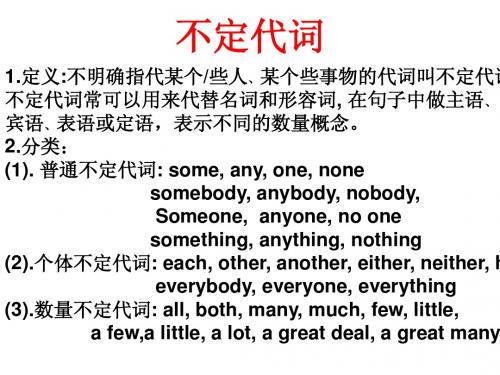
பைடு நூலகம்
1.some,any的用法 (1). Some和any意为“一些,某些,若干”,可修饰复数名词 或 不可数名词,some多用于肯定句中,可做主语、定 语、 宾语等; any 通常用于否定句、疑问句或条件句 中。 Eg: Some are reading, some are writing.(做主语) He has some friends at school. (做定语) There’s no meat in the fridge.Let’s buy some.(做宾语) There aren’t any birds in the tree. Are there any good museums in the city? (2).some可用于疑问句中,表示说话者希望得到对方肯 定的答复或表示真心建议、请求。 Eg: Would you like some bread? (3).any用于肯定句,表示“任何一个”或“任何种类”, 指三种或三者以上的人或物中的“任一个”。 Eg:You can buy this book at any bookstore in our city.
不定代词
1.定义:不明确指代某个/些人、某个些事物的代词叫不定代词 不定代词常可以用来代替名词和形容词, 在句子中做主语、 宾语、表语或定语,表示不同的数量概念。 2.分类: (1). 普通不定代词: some, any, one, none somebody, anybody, nobody, Someone, anyone, no one something, anything, nothing (2).个体不定代词: each, other, another, either, neither, h everybody, everyone, everything (3).数量不定代词: all, both, many, much, few, little, a few,a little, a lot, a great deal, a great many
不定代词用法总结
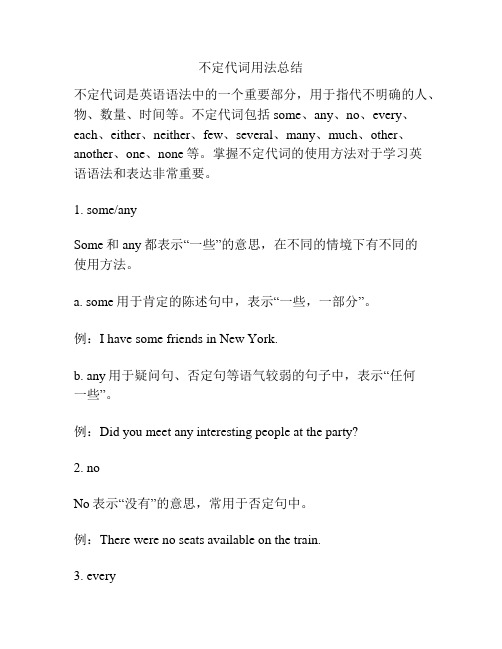
不定代词用法总结不定代词是英语语法中的一个重要部分,用于指代不明确的人、物、数量、时间等。
不定代词包括some、any、no、every、each、either、neither、few、several、many、much、other、another、one、none等。
掌握不定代词的使用方法对于学习英语语法和表达非常重要。
1. some/anySome和any都表示“一些”的意思,在不同的情境下有不同的使用方法。
a. some用于肯定的陈述句中,表示“一些,一部分”。
例:I have some friends in New York.b. any用于疑问句、否定句等语气较弱的句子中,表示“任何一些”。
例:Did you meet any interesting people at the party?2. noNo表示“没有”的意思,常用于否定句中。
例:There were no seats available on the train.3. everyEvery表示“每一个”的意思。
例:Every student is required to attend the meeting.4. eachEach表示“每一个”,用于强调个体。
例:Each student is responsible for his or her own progress.5. either/neitherEither表示“两者中的任何一个”,neither表示“两者都不”。
例:You can choose either the blue or the red dress.例:Neither of us likes to cook.6. few/several/many/much这些代词都用于表示数量或程度。
a. few表示“很少,几乎没有”。
例:There were few people in the park on such a hot day.b. several表示“几个,若干”。
不定代词
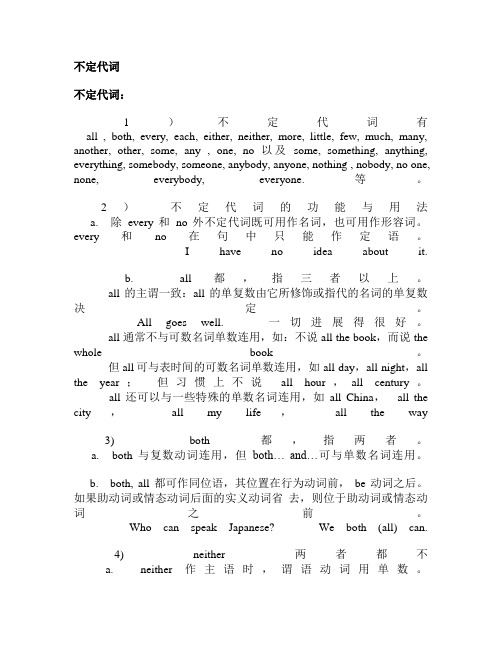
不定代词不定代词:1)不定代词有all , both, every, each, either, neither, more, little, few, much, many, another, other, some, any , one, no 以及some, something, anything, everything, somebody, someone, anybody, anyone, nothing , nobody, no one, none, everybody, everyone.等。
2)不定代词的功能与用法a.除every 和no外不定代词既可用作名词,也可用作形容词。
every和no在句中只能作定语。
I have no idea about it.b.all 都,指三者以上。
all 的主谓一致:all的单复数由它所修饰或指代的名词的单复数决定。
All goes well.一切进展得很好。
all 通常不与可数名词单数连用,如:不说 all the book,而说 the whole book。
但all可与表时间的可数名词单数连用,如 all day,all night,all the year;但习惯上不说all hour,all century。
all还可以与一些特殊的单数名词连用,如all China,all the city,all my life,all the way3)both都,指两者。
a.both 与复数动词连用,但both… and…可与单数名词连用。
b.both, all 都可作同位语,其位置在行为动词前,be 动词之后。
如果助动词或情态动词后面的实义动词省去,则位于助动词或情态动词之前。
Who can speak Japanese?We both (all) can.4)neither两者都不a.neither作主语时,谓语动词用单数。
b. 作定语与单数名词连用,但neither… nor 用作并列连词,可与复数名词连用。
不定代词用法
不定代词用法不定代词是一类特殊的代词,它们不指代特定的人或事物,而是泛指一类人或事物,具有不确定性。
在语法上,不定代词可以在句子中作主语、宾语、定语、状语等成分。
本文将探讨不定代词的用法,并举例说明。
一、不定代词用作主语1. Some people say that money can't buy happiness.2. Anybody can learn to play a musical instrument if they practice hard.3. Everything has its beauty, but not everyone sees it.二、不定代词用作宾语1. I want to buy something for my sister's birthday.2. Could you lend me your pen? I've lost mine.3. She knows someone who can fix the computer.三、不定代词用作定语1. I saw an interesting movie last night.2. Is there any milk left in the fridge?3. This is the only way we can solve the problem.四、不定代词用作状语1. He left without saying goodbye to anyone.2. Please feel free to ask me anything.3. She cried bitterly as if she had lost everything.五、不定代词的其他用法1. I can't find my keys anywhere.2. Nobody is perfect.3. Everyone should be treated with respect.不定代词有许多种,如somebody, anybody, nobody, everybody, something, anything, nothing, everything, somewhere, anywhere, nowhere, etc. 它们在句子中起到强调概括性的作用,使句子更为简洁明了。
16个不定代词用法口诀
16个不定代词用法口诀
好的,以下是一个口诀,帮助记忆16个不定代词的用法:
不定代词有些人,有些事,有些地方,有些时候。
有人,有事,有地,有时,都用some。
没有人,没有事,没有地,没有时,都用any。
所有人,所有事,所有地,所有时,都用all。
每个人,每件事,每个地方,每次时,都用each。
一些人,一些事,一些地方,一些时候,都用several。
不管什么人,不管什么事,不管什么地方,不管什么时候,都用whatever。
无论哪个人,无论哪件事,无论哪个地方,无论哪个时候,都用whichever。
不论多少人,不论多少事,不论多少地方,不论多少时候,都
用whatever。
有的人,有的事,有的地方,有的时候,都用
somebody/someone, something, somewhere, sometime。
没有一个人,没有一件事,没有一个地方,没有一次时,都用nobody/no one, nothing, nowhere, never。
所有人都用everybody/everyone, everything, everywhere, always。
每个人都用each other。
一些人都用several。
任何人都用anybody/anyone, anything, anywhere, anytime。
无论哪个人都用whoever, whichever, whatever, whenever。
希望这个口诀能够帮助你记忆不定代词的用法。
不定代词ppt
Both, either, neither
这三个词都只限用于两者.Both表示“两者都”,是对两者的肯 定.做主语谓语用复数形式.Neither表“两者都不”,是对两者的否 定,做主语视为单数.Both与 neither是一对反义词.Either表“两者 之一”,表肯定,做主语时谓语用单数. eg Both of them are workers. Neither of the answers is correct. There are some trees on either side (or both sides ) of the river. 注意:要把含有both,either的句子改为否定句,只须把both,either改为 neither, eg both of them are in Class Seven.(否定句) Neither is ___of them ____ in Class Seven. Either of the boys is tall. (否定句) Neitherof the boys ____ talll. ____ is
复合不定代词 Something,anything,nothing
Something,anything,nothing的用法和some,any,no的用法 相同.注意:nothing=not anything, 注意:1.做主语时,谓语用第三人称单数形式.Eg there is something on the desk. Something is wrong with your computer. 2.修饰它们的词要放在它们后面.Eg There is nothing important in today’s newspaper. Did he tell you anything funny? 3.表“另外的,其他的”意义时,用else,不用other. Eg: I have nothing else to do. There is nobody else in the room. 类似的词的用法还有:somebody, anybody,nobody 和 some one, anyone,no one ;somewhere, anywhere ,nowhere
不定代词和不定副词
不定代词和不定副词:(一) 不定代词:指人:someone/ somebody anyone/ anybodyno one/ nobody everyone/everybody 指物:something anything nothing everything(二)不定副词指地点:somewhere anywhere nowhere everywhere(三)用法:1.some-复合代词/副词常用于肯定句;如:I saw someone in the room. 我看见房间里有人。
There is something in the woods. 树林里有什么东西。
He has gone somewhere warm for his holiday. 他去暖和的地方度假了。
2.any-复合代词/副词常用于否定句或疑问句;如:I didn’t see anyone in the room. 我没看见有人在房间里。
There isn’t anything in the woods. 树林里没有什么东西。
He hasn’t gone anywhere warm for his holiday.他没去暖和的地方度假。
3.no- 复合代词/副词表全否定;如:I saw nobody in the room. 我看见房间里没有人。
There is nothing in the woods. 树林里没有什么东西。
4.every- 复合代词/副词代替全部;如:Everyone is here. 大家都在这儿。
It seems he knows everything. 似乎他知道一切。
some-复合代词/副词用于疑问句中时,表希望得到对方的肯定回答或表请求;如:Would you like something to drink?你要点喝的东西吗?any-复合代词/副词用于肯定句时,表“任何”;如:If people spit anywhere in public, theyshould be punished.如果人们在公众的任何地方吐痰,他们应该受罚。
